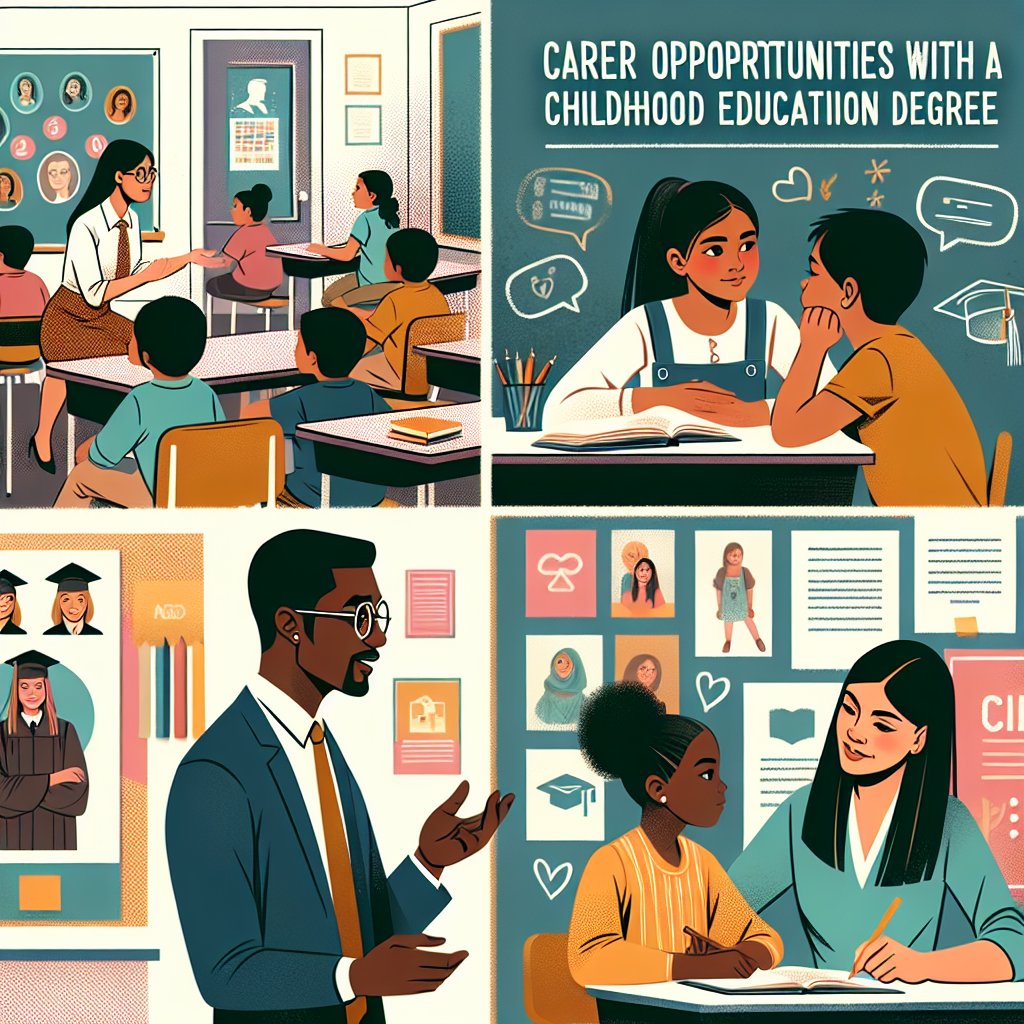Childhood Education Degree. Childhood education lays the foundation for lifelong learning. During these formative years, children develop essential skills and knowledge that will guide them through their educational journey. These early experiences are crucial as they shape children’s cognitive, social, and emotional development. Educators play a pivotal role in nurturing these young minds, making childhood education degrees especially significant. As professionals equipped with the right training, educators influence children’s perspectives on learning and help instill a passion for knowledge that can last a lifetime.
The Role of Educators
Educators are more than just teachers; they are mentors, guides, and influencers. They create a safe and nurturing environment that allows children to explore their abilities and express themselves freely. A childhood education degree equips you with the skills necessary to engage with children, understand their needs, and facilitate their learning in a supportive environment. It prepares you to tailor your teaching strategies to meet diverse learning styles, ensuring that each child has the opportunity to succeed. Educators also play a key role in identifying and addressing any learning challenges early on, providing interventions that can make a significant difference in a child’s educational trajectory.
Impact on Society
Investing in childhood education degrees means investing in the future of society. Educators help mold responsible citizens, critical thinkers, and innovative leaders. By pursuing this path, you contribute to societal development and progress. The ripple effects of quality education extend beyond the classroom, influencing communities and economies on a broader scale. Educators are instrumental in promoting social equity by providing all children, regardless of their background, with the tools they need to thrive. This, in turn, leads to a more informed, engaged, and productive citizenry, laying the groundwork for a prosperous society.
Career Opportunities with a Childhood Education Degree

A childhood education degree opens doors to a variety of career paths. Whether you dream of teaching in a classroom or working behind the scenes in educational policy, this degree can be your gateway. The versatility of a childhood education degree allows you to explore roles that align with your interests and strengths, whether that’s directly interacting with students or shaping educational frameworks. The skills gained through this degree are transferable and in demand, ensuring that you can find a fulfilling career that makes a difference.
Teaching Positions
One of the most common career paths for those with a childhood education degree is becoming a teacher. You can work in preschools, elementary schools, and even specialized education settings. These roles involve crafting lesson plans, assessing student progress, and fostering a love of learning. The demand for qualified educators is consistently high, making this a stable career choice. Moreover, teaching offers opportunities for continual professional growth, as educators can specialize in areas like literacy, mathematics, or science education, further enhancing their impact and career prospects.
Administration and Leadership Roles
With experience and further education, a childhood education degree can lead to roles in school administration or educational leadership. These positions allow you to influence educational policies and programs at a broader level. Leaders in education work to improve the quality of education, implement innovative teaching methodologies, and support teachers and students in achieving their best. By stepping into leadership roles, educators have the chance to shape the educational landscape, ensuring that schools are effective in providing high-quality education to all students.
Special Education
Another rewarding path is special education, where educators work with children who have diverse learning needs. This role requires specialized skills, which can be developed through focused coursework and training within a childhood education degree program. Special education teachers design individualized education plans (IEPs) to cater to the unique needs of each student, ensuring they receive the appropriate support and resources. This career path is both challenging and fulfilling, offering the chance to make a profound impact on the lives of students who require additional support to reach their full potential.
Benefits of Earning a Childhood Education Degree Online

In today’s digital age, many people opt for online education due to its flexibility and accessibility. Earning a childhood education degree online offers several unique advantages. It allows individuals who might otherwise be unable to attend traditional classes, such as those living in remote areas or those with busy schedules, to pursue their educational goals. Online programs are designed to accommodate diverse learners, providing opportunities for professional advancement without the constraints of a traditional campus setting.
Flexibility and Convenience
Online education allows you to learn at your own pace and schedule. This flexibility is especially beneficial for working professionals or those with family commitments. You can balance your studies with other responsibilities, making it easier to pursue a degree without sacrificing other aspects of your life. The ability to access course materials and participate in discussions at any time means you can tailor your education to fit your personal and professional needs, allowing for a more personalized learning experience.
Diverse Learning Resources
Online programs often provide a wealth of resources, including digital libraries, forums, and interactive modules. These tools enhance your learning experience and help you grasp complex concepts more effectively. Engaging with a variety of multimedia resources can cater to different learning preferences and promote a deeper understanding of the material. Additionally, online platforms often facilitate networking with peers and instructors, creating a collaborative learning environment that can enhance your educational journey.
Cost-Effectiveness
Pursuing an education degree online can be more cost-effective than attending traditional on-campus programs. You save on commuting and housing costs, and many online programs offer competitive tuition rates. This financial advantage makes higher education more accessible to a broader audience, enabling more individuals to pursue careers in childhood education. Moreover, online programs often provide flexible payment options and financial aid opportunities, further reducing the economic barriers to obtaining a degree.
Choosing the Right Program
Selecting the right program is crucial to your success in the field of childhood education. Here are some factors to consider when making your decision. Taking the time to thoroughly research and evaluate potential programs will help ensure that you receive a quality education that meets your professional goals. It’s important to find a program that aligns with your values and aspirations, providing the knowledge and skills necessary to excel in your chosen career path.
Accreditation
Ensure the program you choose is accredited by a recognized body. Accreditation guarantees that the program meets specific quality standards and that your degree will be respected by employers. It also ensures that the curriculum is current and relevant, preparing you for the demands of the profession. An accredited program provides assurance that you will receive a comprehensive education that is recognized by educational institutions and employers nationwide.
Curriculum
Review the curriculum to ensure it covers essential topics such as child development, classroom management, and educational psychology. A comprehensive curriculum will prepare you for the challenges of the profession. Look for programs that offer a balance of theoretical knowledge and practical experience, as this combination is crucial for developing effective teaching strategies. Additionally, consider programs that offer opportunities for specialization, allowing you to focus on areas of interest such as early literacy or inclusive education.
Support Services
Consider programs that offer robust support services, including academic advising, career counseling, and technical assistance. These resources can significantly enhance your educational experience and help you succeed. Access to dedicated support services ensures that you have the guidance and resources needed to navigate your academic journey and transition smoothly into the professional world. A strong support network can provide invaluable assistance in overcoming challenges and achieving your educational and career goals.
The Future of Childhood Education

The field of childhood education is constantly evolving. As society changes, so do the needs of students and educators. Staying informed about trends and advancements in education is crucial for anyone pursuing a career in this field. Embracing innovation and adapting to new educational paradigms will equip educators to effectively meet the needs of future generations. Continuous professional development and lifelong learning are essential components of a successful career in childhood education.
Technology in Education
Technology is playing an increasingly important role in education. From digital classrooms to personalized learning apps, technology is transforming how we teach and learn. Being tech-savvy and adaptable will be essential skills for future educators. The integration of technology in education provides opportunities for interactive and engaging learning experiences, enabling educators to meet the diverse needs of students. Educators must be proactive in learning about new technological tools and platforms to enhance their teaching practices and improve student outcomes.
Focus on Diversity and Inclusion
There is a growing emphasis on diversity and inclusion in education. Educators are expected to create environments where all students feel welcome and valued. Understanding cultural differences and promoting inclusivity will be critical components of your role. By fostering an inclusive classroom, educators can support the social and emotional development of all students, encouraging empathy and respect for diverse perspectives. The ability to address and embrace diversity is crucial for preparing students to thrive in an increasingly globalized and interconnected world.
Childhood Education Degree
A childhood education degree is more than just a credential; it’s a pathway to making a difference in the world. Whether you choose to earn your degree online or through a traditional program, you’ll be stepping into a rewarding career that shapes the minds of future generations. As you embark on this journey, remember that your work as an educator has the power to inspire, nurture, and transform lives. By understanding the benefits and opportunities associated with a childhood education degree, you can make an informed decision that aligns with your personal and professional goals.
Embracing the challenges and rewards of a career in childhood education requires dedication, passion, and a commitment to lifelong learning. Your efforts as an educator will contribute to the betterment of society and the empowerment of future generations. As you reflect on the impact you wish to make, consider the diverse paths available within this field and the profound difference you can make in the lives of children and communities.




